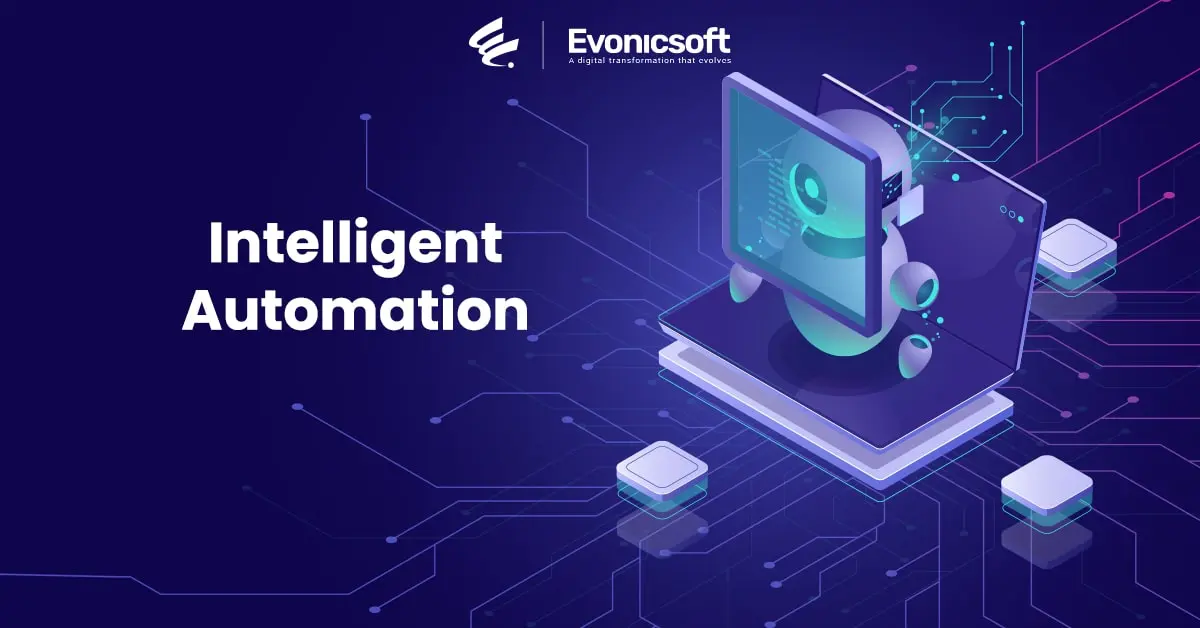
Exploring the Benefits of Intelligent Automation
- Sami Ul Hassan
- 07/02/2024
- Artificial Intelligence (AI), Digital
In today’s fast-paced business world, companies constantly look for ways to streamline processes, increase efficiency, and reduce costs. Intelligent automation is one of the most effective ways to achieve these goals.
Are you looking for AI automation? Evonicsoft is the best choice for you. Have a look at the portfolio.
In this article, we will explore the benefits of IA and how it can update your business.
What is Intelligent Automation?
Intelligent automation is the use of advanced technologies such as artificial intelligence (AI), machine learning, and robotic process automation (RPA) to automate processes and tasks that were previously performed by humans. This technology allows businesses to automate complex and repetitive tasks, freeing up employees to focus on more high-value work.
Intelligent Process Automation (IPA)
Intelligent process automation (IPA) is a subset of intelligent automation that focuses on automating end-to-end business processes. It combines RPA with AI and machine learning to automate entire workflows, from data extraction to decision-making.
Intelligent Test Automation
Intelligent test automation is the use of AI and machine learning to automate software testing. This technology can analyze large amounts of data and identify patterns to improve the accuracy and efficiency of testing.
Intelligent Workflow Automation
Intelligent workflow automation is the use of AI and machine learning to automate workflows and processes. This technology can analyze data and make decisions based on predefined rules, allowing for more efficient and accurate processes.

Benefits of Intelligent Automation
Intelligent automation offers numerous benefits for businesses of all sizes and industries. Let’s take a closer look at some of the most significant advantages.
Increased Efficiency and Productivity
One of the most significant benefits of intelligent automation is increased efficiency and productivity. By automating repetitive and time-consuming tasks, employees can focus on more high-value work, leading to increased productivity and faster completion of tasks.
Automation also reduces the risk of human error, leading to more accurate and consistent results. This can save businesses time and money by avoiding costly mistakes.
Cost Savings
Intelligent or smart automation can also lead to significant cost savings for businesses. By automating tasks previously performed by humans, companies can reduce labor costs and reallocate resources to other business areas.
IA can also help businesses save money by reducing the risk of errors and improving efficiency. This can lead to cost savings in areas such as customer service, data entry, and compliance.
Improved Customer Experience
Intelligent automation can also improve the customer experience by streamlining processes and reducing wait times. For example, IA can be used in customer service to automate responses to common inquiries, freeing up employees to handle more complex issues.
IA can also improve the accuracy and speed of data entry, leading to faster response times and a better overall customer experience.
Better Decision-Making
Intelligent automation can also help businesses make better decisions by providing real-time data and insights. Businesses can access accurate and up-to-date information by automating data collection and analysis, allowing for more informed decision-making.
IA can also identify patterns and trends in data that humans may not have noticed, leading to more strategic and data-driven decisions.
Increased Scalability
Intelligent automation can also help businesses scale their operations without increasing costs. By automating processes, businesses can handle a higher volume of work without hiring additional employees.
This scalability is especially beneficial for businesses with seasonal or fluctuating workloads. IA allows companies to handle increased demand without needing temporary staff or overtime pay.
Competitive Advantage
In today’s competitive business landscape, companies constantly seek ways to gain an edge over their competitors. IA can provide this advantage by streamlining processes, reducing costs, and improving efficiency.
By implementing automation, businesses can free up resources to focus on innovation and strategic initiatives, giving them a competitive edge in the market.
Real-World Examples of Intelligent Automation
Intelligent automation is being used in various industries and businesses worldwide. Let’s look at real-world examples of how intelligent automation upgrades processes and drives success.
Intelligent Automation in Insurance
The insurance industry is known for its complex and time-consuming processes. However, with the implementation of IA, insurance companies can streamline processes and improve efficiency.
For example, intelligent automation can be used to automate claims processing, reducing the time it takes to process a claim from weeks to just a few days. This improves the customer experience and reduces costs for the insurance company.
Intelligent Automation in Healthcare
In the healthcare industry, automation is being used to improve patient care and reduce costs. For example, intelligent automation can be used to automate appointment scheduling, freeing up staff to focus on patient care.
IA can also be used to analyze patient data and identify patterns, leading to more accurate diagnoses and treatment plans.
Intelligent Automation in Finance
The finance industry is another sector that can benefit greatly from intelligent automation. By automating processes such as data entry and reconciliation, financial institutions can reduce the risk of human error and improve efficiency.
It can also be used to analyze financial data and identify trends, leading to more informed investment decisions.
Implementing Intelligent Automation in Your Business
Implementing automation in your business can seem daunting, but it can be a smooth and successful process with the right approach.
Identify Areas for Automation
The first step in implementing intelligent automation is identifying areas of your business that can benefit from automation. Look for processes that are time-consuming, repetitive, and prone to human error.
Choose the Right Technology
Many intelligent automation tools are available on the market, so it’s essential to choose the right one for your business. Consider factors such as cost, ease of use, and compatibility with your existing systems.
Train Employees
Intelligent automation will only be successful if your employees are trained to use it effectively. Provide training and support to ensure that your team understands how to use the technology and can maximize its benefits.
Regularly Monitor and Improve
Intelligent automation is not a one-time implementation; it requires continuous monitoring and improvement. Regularly review processes and adjust as needed to ensure that your IA delivers the desired results.

Conclusion
Intelligent automation offers numerous benefits for businesses, including increased efficiency, cost savings, and improved decision-making. By implementing IA, companies can streamline processes, reduce costs, and gain a competitive advantage in their industry.
With the right approach and technology, business automation can upgrade your business and drive success. So why delay? Start exploring the benefits of intelligent automation for your business today.






